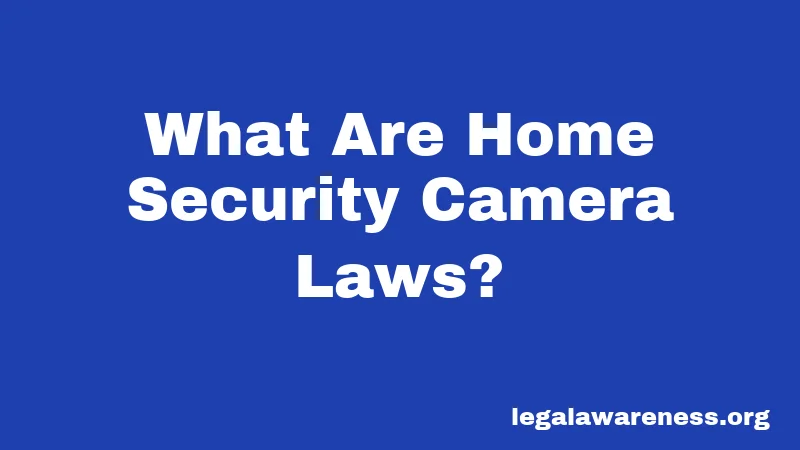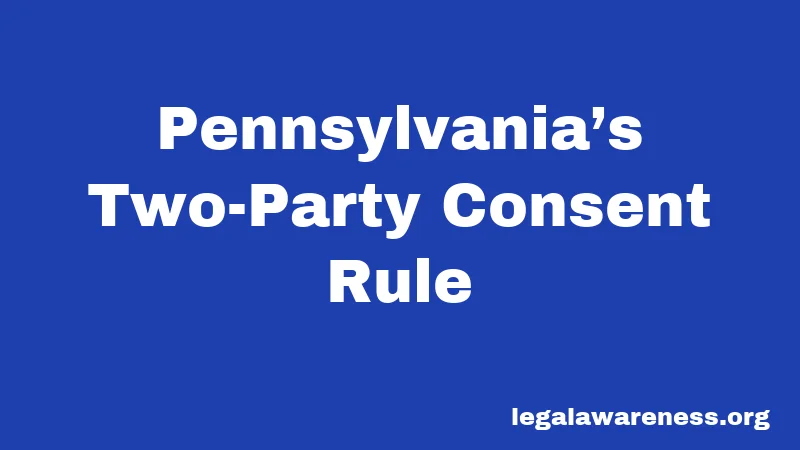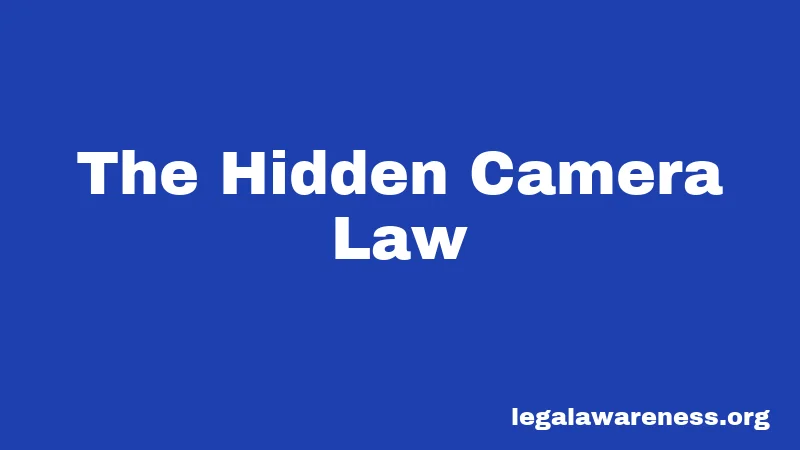Pennsylvania Home Security Camera Laws (2026): Your Complete Legal Guide
Most people think putting up a security camera is simple. Just aim it at your driveway and you’re good, right? Actually, Pennsylvania has some of the strictest camera laws in America. The rules might surprise you. But don’t worry—once you understand them, you’ll know exactly what’s legal.
Here’s the thing: video cameras are totally fine. Audio recording is where Pennsylvania gets strict. Really strict. Let’s break down what you actually need to know.
What Are Home Security Camera Laws?

Security cameras let you protect your home and catch criminals if something happens. They’re useful tools. But the law needs to balance that with people’s privacy rights. That’s why Pennsylvania created specific rules about where you can point cameras and when you can record sound.
Think of it like this: your right to protect your home matters. But your guests’ right to privacy matters too. The law tries to find the middle ground.
The Basic Rule: Video Without Audio
Here’s the simple version that most people need to know: You can record video on your property without getting anyone’s permission. Seriously. It’s that straightforward.
Your security camera can monitor your driveway, front door, backyard, and yard. You can even catch part of your neighbor’s property by accident. That’s totally fine. But here’s the important part—you cannot point a camera directly at your neighbor’s window or their bedroom.
What about the audio? Hold on. This is where things get important.
Pennsylvania’s Two-Party Consent Rule

Pennsylvania is a “two-party consent” state. That means everyone in a conversation must agree before you record the audio. Not just one person. Everyone.
This applies to your doorbell camera with a microphone. It applies to security cameras that capture conversations. It applies to everything. You cannot record anyone talking without their permission. Not your guests. Not service workers. Not neighbors in your yard.
Wondering if this applies to you? It definitely does if you have audio recording capabilities. Most homeowners don’t realize how strict this rule is.
What Happens If You Record Audio Illegally?
The penalties are serious. Really serious. This isn’t something the state takes lightly.
Recording someone without consent is a third-degree felony. You could face up to seven years in prison. You could also pay fines up to $15,000. Think of it like a traffic ticket, but with years of jail time attached.
Victims can also sue you in civil court. They can recover actual damages, plus $100 per day for each day of the violation. They could demand punitive damages too. The costs add up fast.
The good news? Many people avoid this by disabling audio on their cameras. Honestly, this is the part most people miss.
The Hidden Camera Law

Pennsylvania also has a specific law about hidden cameras. This one focuses on privacy in intimate situations.
You cannot use hidden cameras in places where people expect privacy. Bathrooms are the obvious one. Bedrooms too. Dressing rooms. Locker rooms. These are places where someone would reasonably expect no one is watching them.
Violating this law is a misdemeanor. You could face up to one year in jail and up to $2,500 in fines. That’s still serious, even if it’s less severe than the audio recording felony.
Stay with me here. The law cares most about intimate areas. But it also cares about consent. Are these two things the same? Not exactly. Let me break it down.
The “Reasonable Expectation of Privacy” Test
Courts in Pennsylvania use something called the “reasonable expectation of privacy” test. Basically, they ask: would a normal person think they should have privacy in this location?
Your bathroom? Definitely yes. Your backyard with a tall fence? Probably yes. A public sidewalk in front of your house? Definitely no. Your front porch where the mailman walks? Probably no.
This test matters because it affects both video and audio recording. It affects whether you need permission. It affects whether you’re breaking the law.
Confused about the difference? Let me break it down. Video in areas with reasonable privacy expectations is illegal. Audio recording without consent is always illegal, even in public spaces.
Signage Requirements
Pennsylvania doesn’t absolutely require you to post signs. But honestly, posting signs is the smart move. It protects you legally.
If you put up a visible camera and a sign saying “Recording,” you’re being transparent. Courts love transparency. People can’t claim they were shocked to be recorded if the sign was right there.
Businesses especially should post signs. Homeowners don’t have quite as strict a requirement, but it’s still a good idea.
Special Rules for Employers
If you own a business in Pennsylvania, the rules get a bit stricter. You can use cameras to monitor your property and deter crime. That’s legitimate.
But you can’t use cameras to surveil employees in areas where they expect privacy. Locker rooms and bathrooms are obvious. Break rooms are trickier. Some courts say employees have privacy expectations there.
You also need to notify your employees that cameras exist. Tell them where the cameras are. Tell them what you’re doing with the footage. If you have unionized workers, you might need to discuss this with the union too.
What About Your Neighbor’s Privacy?
Here’s a real-world scenario: You install a security camera above your front door. It catches your driveway. But it also catches a tiny corner of your neighbor’s yard where their kids play sometimes.
Is that legal? Actually, yes. Incidental recording of someone else’s property is fine. You’re not pointing the camera at them on purpose.
But what if you angle your camera directly at your neighbor’s bedroom window? Now you’re in trouble. That’s an invasion of privacy. Your neighbor could sue you. Police might get involved.
Make sense? Yep. It’s about intent and direction. Are you trying to monitor their private areas? That’s illegal. Are you just protecting your own space? That’s fine.
Recent Changes: Cloud Storage Encryption (Important)
New information came out in 2024 that matters to homeowners. Pennsylvania updated its Data Breach Notification Law.
If you store security footage in the cloud—meaning on a company’s servers online—that footage must be encrypted by January 2026. Encryption basically means the footage is locked with a code so hackers can’t steal it.
This doesn’t affect most homeowners with simple camera systems. But if you use cloud storage from Google, Amazon, or another company, check whether it’s encrypted. Ask your camera company if you’re not sure.
How to Stay Legal: A Practical Checklist
Want to know what you actually need to do? Here’s the straightforward guide.
First, use video cameras without audio. That solves most problems right there. Most modern cameras let you turn off the microphone. Do it.
Second, avoid pointing cameras at areas where people expect privacy. Skip the neighbor’s windows. Skip your own bathroom if you have exterior cameras. Common sense applies here.
Third, post a visible sign if you can. Something that says “Video Surveillance in Progress” is perfect. Homeowners aren’t required to do this, but businesses are. Either way, it’s smart.
Fourth, keep your camera recordings secure. If you use cloud storage, make sure it’s encrypted. Change your passwords regularly. Don’t share footage with people who shouldn’t see it.
Fifth, never use footage for purposes other than security. Don’t record people to monitor their behavior for performance reviews. Don’t record to embarrass someone. Record only for legitimate security purposes.
What If Someone Violates Your Privacy?
If you believe someone has recorded you illegally, you have options. You can contact police and file a report. You can hire an attorney and pursue civil damages.
Pennsylvania law lets victims recover money from people who record them illegally. You can recover actual damages. You can also recover $100 per day for each day of the violation. Punitive damages are possible too, which means extra money to punish the violator.
Doorbell Cameras: Special Considerations
Doorbell cameras are super popular. People like the convenience. But they create legal questions.
The video part is fine. Record your front porch all day if you want. But the audio? That’s where you need to be careful.
You can record audio of conversations you’re part of. If someone rings your doorbell and you talk to them, you can record that conversation. They can probably see the camera is there. That provides consent because they’re knowingly talking to a recorded device.
But what if you record audio of people talking to each other on your porch when you’re not there? That’s different. That’s probably illegal.
The safest option? Disable audio on your doorbell camera. You still get video security. You just avoid the audio recording mess.
Drone Surveillance Over Your Property
Here’s an interesting one: What about drones hovering over your yard?
Pennsylvania has specific drone laws. A drone operator cannot knowingly conduct surveillance of someone in a private place. Flying a drone over your yard and recording through your window is illegal.
If someone does this to you, you can sue them. You have legal standing to pursue damages. It’s an invasion of privacy.
What You Shouldn’t Do
Let’s be clear about the mistakes people make. Don’t record conversations without consent. That’s the biggest one. It’s a felony. It ruins lives.
Don’t install hidden cameras in private areas. That’s a misdemeanor at minimum. It’s also deeply wrong.
Don’t use footage for things other than security. Don’t share it to embarrass people. Don’t sell it. Don’t post it on social media just for fun.
Don’t forget to disable audio if you’re concerned. Honestly, this is the easiest way to stay legal.
Law Enforcement and Warrants
What about police? Can they install cameras on your property without permission?
No. The Fourth Amendment protects you from unreasonable searches. Police need a warrant to conduct surveillance. They need a good reason. They need court approval.
This has nothing to do with your home security camera. But it’s good to know your rights. If police ever want to put a camera on your property, they need a warrant.
Frequently Asked Questions
Can I record visitors to my home on video?
Yes, absolutely. You can record anyone on your property without their permission. Just make sure the audio is off unless they know and consent to being recorded.
What if my camera accidentally records my neighbor’s bedroom?
If it’s accidental—meaning you weren’t aiming at their window on purpose—you’re probably fine legally. But it’s worth adjusting the camera anyway to avoid the hassle.
Do I need to tell guests I’m recording?
Not required, but it’s a good idea. Posting a sign is smart. Mentioning it is even better. Transparency protects you.
What if someone breaks into my home? Can I use the camera footage in court?
Yes, if it was obtained legally. Footage from cameras recording areas without privacy expectations is admissible in court. It can help police catch the criminal.
Are there any exceptions to the two-party consent rule?
Yes, a few. Law enforcement can record with court approval. People in public spaces with no reasonable privacy expectation can be recorded without consent. But these exceptions are narrow.
Can I record someone trespassing on my property?
You can record video. You can use it as evidence against them. But if you record audio of a conversation with them without consent, that might be illegal. Stick to video.
What if my homeowner’s insurance requires cameras?
Insurance companies can require security cameras for liability reasons. But they can’t require you to violate Pennsylvania law. Follow the laws regardless of what insurance says.
Do I need to keep footage forever?
No. Most people keep 30 to 90 days worth of footage. Longer is fine if you have storage space. You don’t need to keep it forever. Just keep it long enough that it might be useful.
Final Thoughts
Pennsylvania takes privacy seriously. That’s actually a good thing. It means your privacy is protected too. The flip side is that you need to follow the rules when you install cameras.
The basics are simple: video recording is fine in most places. Audio recording requires everyone’s permission. Hidden cameras in private areas are illegal. Respect your neighbors’ privacy.
When in doubt, disable audio. Post a sign. Point cameras at your own property. This approach keeps you safe legally and maintains good relationships with neighbors.
Now you know the basics. Stay informed, stay safe, and when something feels unclear, ask a lawyer. Your peace of mind is worth it.
